Jewish History
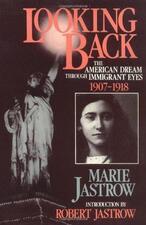
Marie Grunfeld Jastrow
Author of two critically acclaimed books on immigrant life, Marie Grunfeld Jastrow was educated in a German school, and lived in Serbia before moving to New York with her family at age ten. Her two memoirs, A Time to Remember: Growing Up in New York Before the Great War and Looking Back: The American Dream through Immigrant Eyes, touched audiences deeply.
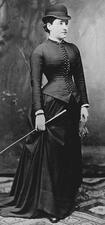
Jewish Feminism in Post-Holocaust Germany
Jewish feminism in Germany today is an expression of a wide-reaching renewal of Judaism occurring in many European countries since the early 1990s. German Jewish feminists built on the historical tradition of the Jewish women’s movement in pre-Holocaust Germany and has since taken many paths.
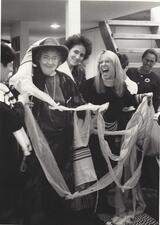
Jewish Feminism in the United States
Challenging all varieties of American Judaism, feminism has been a powerful force for popular Jewish religious revival. The accomplishments of Jewish feminists have transformed American Jewish life, even as the ultimate goal of gender equity and shared power has yet to be fully realized.
Jewish Migrations to the United States in the Late Twentieth Century
Jewish Mothers of the Plaza de Mayo
The Jewish women who formed part of the Mothers of the Plaza de Mayo were pivotal to the human rights movement in Argentina, fighting for truth and justice for victims of the 1976-1983 dictatorship that resulted in 30,000 disappeared, tortured, and killed.
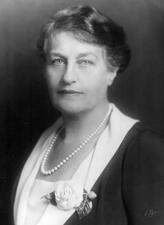
Jewish Museums in the United States
American Jewish women have played an outsized role in the foundation of Jewish museums all over the country. Barred from traditional spaces of power in the early twentieth century, many women—adjacent to power as Rebbetzins, philanthropists, and secretaries of libraries and other Jewish organizations—leveraged their connections to found new kinds of cultural institutions: museums.
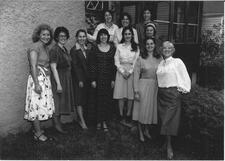
Women, Music, and Judaism in America

Jewish Women Partisans
The testimonies of Jewish women partisans present a more complex gendered picture of partisan activism than the conventional portrayal of an exclusively male arena of armed guerillas. Women smuggled guns and ammunitions, fought in armed combat, engaged in reconnaissance activities, mobilized resistance, documented partisan activities, tended the wounded, and rescued and sheltered fellow Jews.
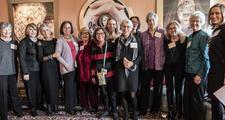
Jewish Women's Archive
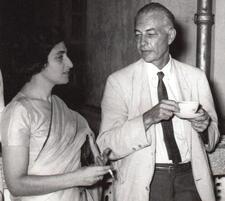
Ruth Prawer Jhabvala
Ruth Prawer Jhabvala was a novelist, short story writer, and two-time Academy Award-winning screenwriter. Known for her nuanced depiction of exile and identity, she is the only person to have won both a Booker Prize and an Oscar.
Roza Shoshana Joffe
Roza Shoshana Joffe was a teacher who made Aliyah from the Ukraine, determined to establish a school for girls in Palestine. After many years teaching in Jaffa, she left the city for a village near the Sea of Galilee, where she bought and operated her own farm and hoped to open a school for farmers’ daughters.
Anna Maria Jokl
Author, psychoanalyst, and scriptwriter Anna Maria Jokl was greatly influenced by the many places she lived: Vienna, Berlin, Prague, London, Zurich, and Jerusalem. Forced to flee countries twice because of Nazism, Jokl is best known for her German children’s books. Her prolific career includes accomplishments in radio broadcasting, psychoanalytic writing, and autobiographical prose.
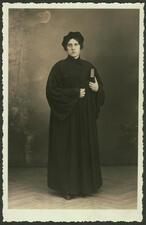
Regina Jonas
Regina Jonas longed to become a rabbi for most of her life, and despite significant obstacles, was ordained in 1935. As the first ordained female rabbi, she worked in Berlin until her deportation to Theresienstadt, where she continued to preach, teach, and inspire her fellow inmates until her final deportation to Auschwitz.
Helen Joseph
An internationally renowned puppeteer and author on marionettes, Helen Haiman Joseph made a career entertaining and educating audiences of all ages with the performance of puppetry. She created the Pinocchio Players in 1924, writing and producing plays for clubs, schools, and hospitals. Joseph also wrote several children’s books.
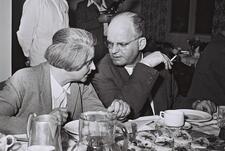
Senta Josephthal
Senta Josephthal was German-born Zionist activist who was particularly influential in the kibbutz movement. She trained and recruited young Germans to the movement and represented the kibbutz movement in national organizations and political arenas after emigrating to Palestine.
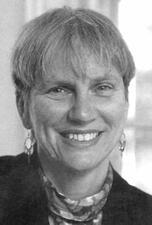
Judaic Studies in the United States
When the Association for Jewish Studies (AJS) was established in 1969 as the professional organization of scholars in the interdisciplinary field of Judaic studies, there were no women among its founders. Within the past few generations, however, a field that was traditionally dominated by men has gradually witnessed the emergence of many women scholars.

Juedischer Frauenbund (The League of Jewish Women)
Founded in 1904, The League of Jewish Women pursued secular German feminist goals while maintaining a strong sense of Jewish identity. The League supported vulnerable women through practical social reforms while fighting for political power within the German Jewish community. It saw employment opportunities as essential to women’s economic, psychological, and emotional independence.
Elena Kabischer-Jakerson
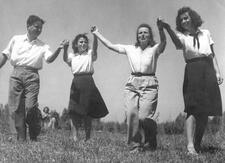
Gurit Kadman
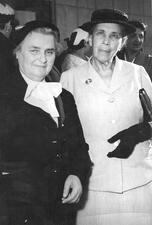
Rachel Kagan (Cohen)

Helena Kagan
Helena Kagan, a pioneer of pediatric medicine in pre-State Palestine, is known to this day as the children’s doctor of Jerusalem, the city where she settled following her aliyah in 1914. Kagan tended to generations of children—Jews, Muslims, and Christians—saving many of them from sickness and death.
Dorothy C. Kahn
During the Great Depression, Dorothy C. Kahn helped pioneer social work as a service provided by the government to all who needed it. Kahn developed, implemented, and advocated for social welfare programs and policies whose underlying principles upheld her deepest beliefs about what social welfare could mean in a democracy.
Margarete Kahn
German mathematician Margarete Kahn worked with fellow Jewish woman Klara Löbenstein and their essential contribution to a famed problem was cited in the publications of several others. Despite earning her doctorate and having a significant impact in her field, Kahn was unable to earn a post-doctoral degree due to discrimination against women, and she worked as a teacher until she was deported by the Nazis.
Miriam Kainy
Miriam Kainy, Israel’s first established woman playwright, won the Israel Prime Minister’s Literary Prize in 1997. All sixteen of her plays were written in Hebrew and produced by Israel’s established theater companies. Kainy has also written manuscripts for radio and television and adapted dramas from English and Yiddish into Hebrew.
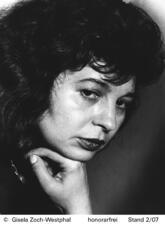
Mascha Kaléko
Mascha Kaléko was a German-Jewish poet whose literary works have made her a mainstay of the German poetic cannon. She is best known for content, diction, rhythm, and Kalékoesque rhyme.


